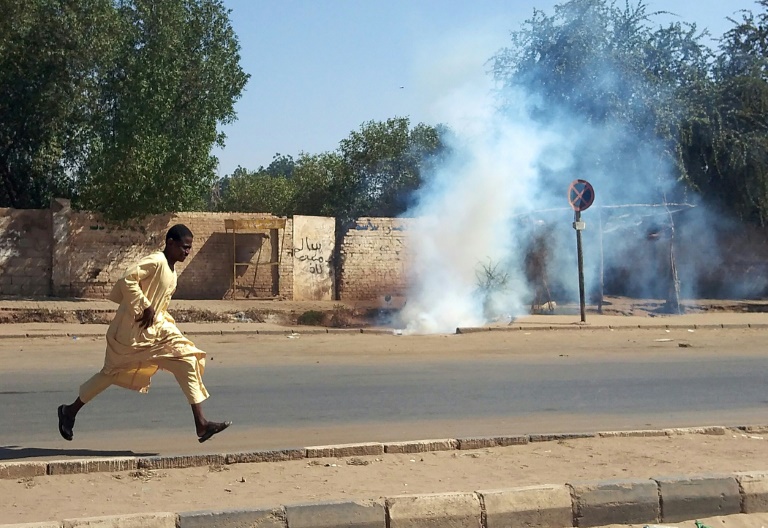Sudanese security forces shot dead at least one protester Saturday in a crackdown on anti-coup demonstrations, medics said, after the military tightened its grip by forming a new ruling council.
The pro-democracy protests come nearly three weeks after top general Abdel Fattah al-Burhan ousted the government, detained the civilian leadership and declared a state of emergency.
“One protester was killed in Omdurman by the bullets of the putschist military council,” an independent union of medics said, adding that others in Khartoum were wounded by live ammunition rounds.
Gunshots were heard and tear gas fired as security forces sought to break up demonstrations in Khartoum and neighbouring cities, witnesses and AFP correspondents said.
“No, no to military rule”, “Civilian (rule) is the people’s choice”, and “Down with the entire council”, protesters in southern Khartoum shouted.
Tens of thousands rallied nationwide, with protests taking place in the cities of Atbara, Port Sudan and Wad Madani, as well as in the states of Kassala and North Kordofan, witnesses said.
“The military should not have anything to do with politics, they should safeguard the constitution which Burhan himself has turned against,” said protester Ahmed Abdelrahman in Khartoum.
The military’s October 25 takeover drew widespread international condemnation, as did a deadly crackdown on demonstrators demanding it restore Sudan’s democratic transition.
Any hopes the demonstrators had that the military would back down were dashed on Thursday, when Burhan named himself as the head of a new ruling Sovereign Council that excludes the country’s main civilian bloc, triggering more condemnation from the West.
– Call for restraint –
The protests occurred despite the heavy presence of military, police and paramilitary forces in Khartoum, where bridges connecting the capital to neighbouring cities were sealed off.
The security forces also blocked roads in the capital leading to the army headquarters, the site of a 2019 mass sit-in that led to the ouster of autocrat Omar al-Bashir.
Information Minister Hamza Baloul, who was briefly detained in the military takeover, took part in Saturday’s protests in Khartoum.
“The Sudanese people have decided to create a civilian nation and there is no will stronger than that of the Sudanese people’s,” he said in a video posted online, urging them to press on with “peaceful demonstrations until the fall” of the coup leaders.
Demonstrations were also organised elsewhere around the world.
In Paris, around 400 people in a central square denounced the coup and called for the “immediate handover of power to civilians” in Khartoum, an AFP correspondent reported.
In Berlin, about 100 protesters at Brandenburg Gate carried a banner that read: “A victory for the Sudanese protesters… is a victory for all of us!”
The UN had called on the security forces to refrain from violence, which since the coup has already left dead at least 16 people, according to the medics’ union.
Saturday’s demonstrations were largely organised by informal groups known as “resistance committees”, which emerged during the 2019 anti-Bashir demonstrations.
They have called for multiple protests since the coup and mobilised crowds via text messages as Sudan has largely remained under a rigorous internet outage with phone lines intermittently disrupted.
– ‘Gravely concerned’ –
On Friday, military figures and new civilian members of a new ruling council were sworn in before Burhan.
Three former rebel leaders who were members of the ousted Sovereign Council and were appointed to the new one did not attend the ceremony. They had previously rejected the military coup.
The newly named council features several new and little-known figures to represent civilians.
But it excludes any members of the Forces for Freedom and Change (FFC), an umbrella alliance which spearheaded the anti-Bashir protests, and the main bloc calling for a transition to civilian rule.
The UN has criticised the military’s latest “unilateral” step, while Western countries said it “complicates efforts to put Sudan’s democratic transition back on track”.
Burhan insists the military’s move on October 25 “was not a coup” but a push to “rectify the course of the transition”.










